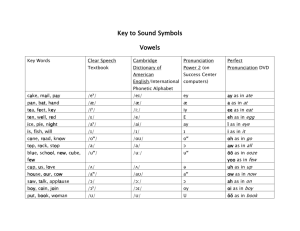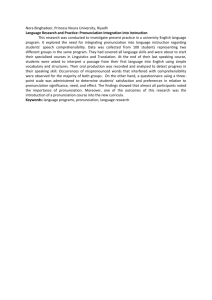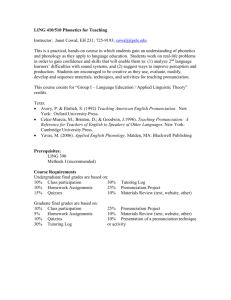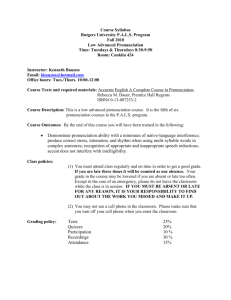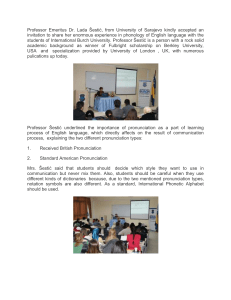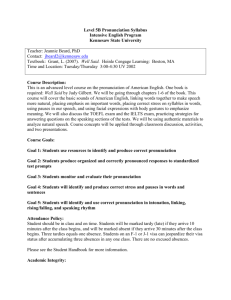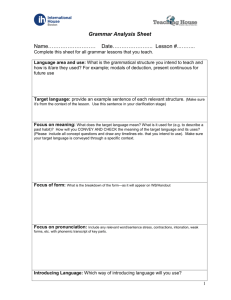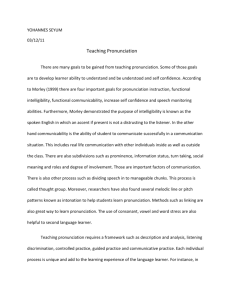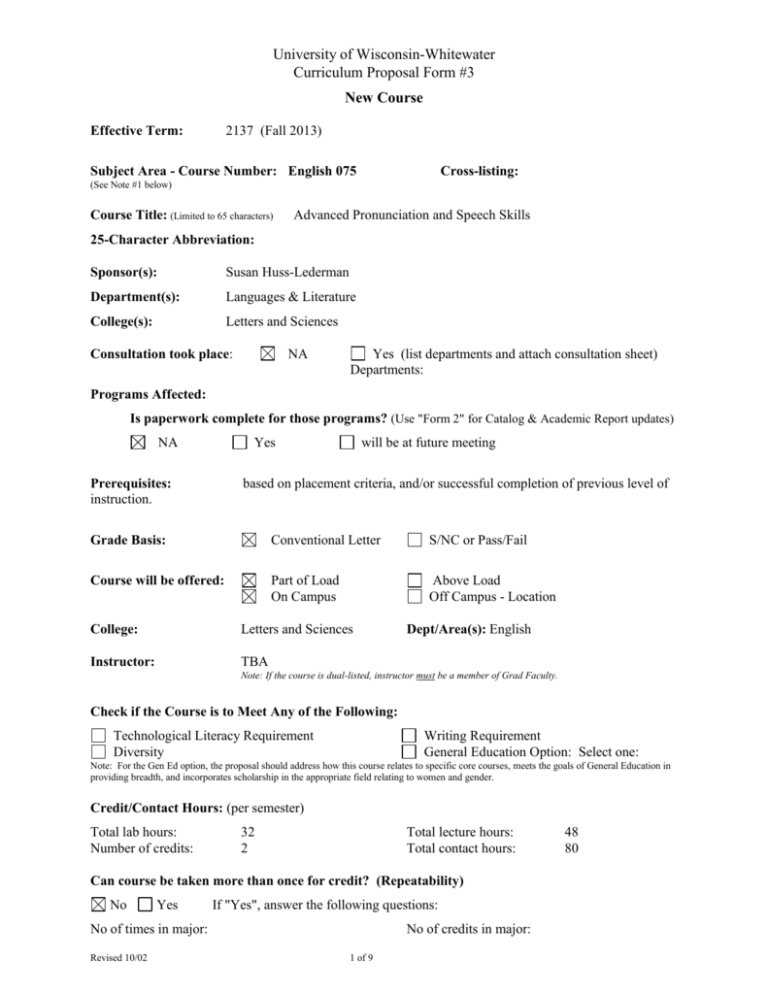
University of Wisconsin-Whitewater
Curriculum Proposal Form #3
New Course
Effective Term:
2137 (Fall 2013)
Subject Area - Course Number: English 075
Cross-listing:
(See Note #1 below)
Course Title: (Limited to 65 characters)
Advanced Pronunciation and Speech Skills
25-Character Abbreviation:
Sponsor(s):
Susan Huss-Lederman
Department(s):
Languages & Literature
College(s):
Letters and Sciences
Consultation took place:
NA
Yes (list departments and attach consultation sheet)
Departments:
Programs Affected:
Is paperwork complete for those programs? (Use "Form 2" for Catalog & Academic Report updates)
NA
Yes
Prerequisites:
instruction.
will be at future meeting
based on placement criteria, and/or successful completion of previous level of
Grade Basis:
Conventional Letter
S/NC or Pass/Fail
Course will be offered:
Part of Load
On Campus
Above Load
Off Campus - Location
College:
Letters and Sciences
Instructor:
TBA
Dept/Area(s): English
Note: If the course is dual-listed, instructor must be a member of Grad Faculty.
Check if the Course is to Meet Any of the Following:
Technological Literacy Requirement
Diversity
Writing Requirement
General Education Option: Select one:
Note: For the Gen Ed option, the proposal should address how this course relates to specific core courses, meets the goals of General Education in
providing breadth, and incorporates scholarship in the appropriate field relating to women and gender.
Credit/Contact Hours: (per semester)
Total lab hours:
Number of credits:
32
2
Total lecture hours:
Total contact hours:
Can course be taken more than once for credit? (Repeatability)
No
Yes
If "Yes", answer the following questions:
No of times in major:
Revised 10/02
No of credits in major:
1 of 9
48
80
No of times in degree:
Revised 10/02
No of credits in degree:
2 of 9
Proposal Information: (Procedures for form #3)
Course justification:
The mission of the UWW-IEP is to prepare international students with the integrated skills they need to
communicate effectively in English in university academic and community social settings by providing a
multi-level curriculum based on contextual needs, and by offering ongoing academic support once students
have matriculated into UW-Whitewater programs.
The Department of Languages and Literatures serves as the academic home for the UW-Whitewater
Intensive English Program. However, the administrative arm of the UWW-IEP shared by the School of
Graduate Studies and Continuing Education and the Center for Global Education.
An assessment plan for the UWW-IEP is being developed in accordance with criteria established by the
Commission on English Language Program Accreditation (CEA) and the American Association of
Intensive English Programs (AAIEP), both national accrediting organizations recognized by the
International Student and Exchange Visitor Program of the U.S. Department of Homeland Security and the
Bureau of Educational and Cultural Affairs of the U.S. Department of State.
Relationship to program assessment objectives:
Students are evaluated by their gain in language proficiency (as measured by the ACT Compass) and by
their scores on exams (at least 80% to pass the course), completion of homework assignments, and graded
work. Students will join instructors in selecting pieces for a developmental portfolio, which will be used by
UWW-IEP instructors to evaluate student performance and inform decisions to promote students to the
next level in the program or to recommend program exit. Annually, student portfolios will be reviewed to
ensure that UWW-IEP program standards are kept consistent, similar to practices used within the programs
in French, Spanish, and German.
Budgetary impact: N/A
Course description: (50 word limit)
In English 075, students refine accuracy in pronunciation and further refine their control of spoken English
for comprehensibility in social and academic settings. Students will conduct a community project in which
they speak to a general audience (such as a school group or a children’s library story time). Students must
pass this course with a C- or better to advance in the IEP.
If dual listed, list graduate level requirements for the following:
1. Content (e.g., What are additional presentation/project requirements?)
2. Intensity (e.g., How are the processes and standards of evaluation different for graduates and
undergraduates? )
3. Self-Directed (e.g., How are research expectations differ for graduates and undergraduates?)
Course objectives and tentative course syllabus:
Identify areas of strength and need for improvement in speech.
Identify and use appropriate paralinguistic cues (change in pitch or volume) to enhance meaning.
Revised 10/02
3 of 9
Incorporate gestures into oral self-expression.
Identify and use reduced forms of phrases (hafta, wanna, gonna).
Use tag questions to elicit agreement or in confirming expressions.
Keep a conversation going.
Bibliography: (Key or essential references only. Normally the bibliography should be no more than one or two
pages in length.)
Pronunciation
Avery, P. E. S. (1992). Teaching American English pronunciation. New York: Oxford University
Press.
Brown, H. D. (2004). Principles of language learning and teaching (5th ed.). New York:
Longman.
Brown, H. D. & Priyanvada, Abeywickrama (2010). Language assessment: Principles and
classroom practices (2nd ed.). New York: Longman.
Celce-Murcia, M. (2001). Teaching English as a second or foreign language. Boston: Heinle &
Heinle.
Celce-Murcia, M. (2010). Teaching pronunciation. New York: Cambridge University Press.
Chen, H.-Y., & Goswami, J. S. (2011). Structuring cooperative learning in teaching English
pronunciation. [Article]. English Language Teaching, 4(3), 26-32. doi:
10.5539/elt.v4n3p26
Gilakjani, A. P., & Ahmadi, M. R. (2011b). Why is pronunciation so difficult to learn? [Article].
English Language Teaching, 4(3), 74-83. doi: 10.5539/elt.v4n3p74
Gilbert, J. B. (2005). Clear speech: Pronunciation and listening comprehension in North
American English: student's book (3rd Ed.). New York: Cambridge University Press.
Grant, L. (2010). Well said: Pronunciation for clear communication (2nd Ed). Boston: Cengage.
Hui-Ling, H., & Radant, J. (2009). Chinese phonotactic patterns and the pronunciation
difficulties of Mandarin-speaking EFL learners. [Article]. Asian EFL Journal, 11(4), 148168.
Isaacs, T. (2009). Integrating form and meaning in L2 pronunciation instruction. [Article]. TESL
Canada Journal, 27(1), 1-12.
Malcolm, D. (2009). Reading strategy awareness of Arabic-speaking medical students studying
in English. System, 37(4), 640-651.
Nation, I. S. P. & Newton, J. (2009). Teaching ESL/EFL listening and speaking. New York:
Routledge.
Samuel, C. (2010). Pronunciation pegs. [Article]. TESL Canada Journal, 27(2), 103-113.
Swan, M., & Smith, B. (2001). Learner English: A teacher's guide to interference and other
problems. Cambridge: Cambridge University Press Edition: 2nd ed.
Tokumoto, M., & Shibata, M. (2011). Asian varieties of English: Attitudes towards
pronunciation. [Article]. World Englishes, 30(3), 392-408. doi: 10.1111/j.1467971X.2011.01710.x
Revised 10/02
4 of 9
Tominaga, Y. (2009). An analysis of successful pronunciation learners: In search of effective
factors in pronunciation teaching. [Article]. Journal of Pan-Pacific Association of
Applied Linguistics, 13(1), 127-140.
Trofimovich, P., Lightbown, P. M., Halter, R. H., & Song, H. (2009). Comprehension-based
practice: The development of L2 pronunciation in a listening and reading program.
[Article]. Studies in Second Language Acquisition, 31(4), 609-639. doi:
10.1017/s0272263109990040
Wette, R. (2010). Evaluating student learning in a university-level EAP unit on writing using
sources. Journal of Second Language Writing, 19(3), 158-177.
Wingate, U. (2012a). ‘Argument!’ helping students understand what essay writing is about.
Journal of English for Academic Purposes, 11(2), 145-154.
Wingate, U. (2012b). Using academic literacies and genre-based models for academic writing
instruction: A ‘literacy’ journey. Journal of English for Academic Purposes, 11(1), 26-37.
Wong, M. (2008). Can consciousness-raising and imitation improve pronunciation? [Article].
International Journal of Learning, 15(6), 43-47.
Speaking
Aljumah, F. H. (2011). Developing Saudi EFL students' oral skills: An integrative approach.
[Article]. English Language Teaching, 4(3), 84-89. doi: 10.5539/elt.v4n3p84
Anderson, K., Lynch, T., & Maclean, J. (2004). Study speaking: a course in spoken English for
academic purposes. New York: Cambridge University Press.
Biber, D., Gray, B., & Poonpon, K. (2011). Should we use characteristics of conversation to
measure grammatical complexity in L2 writing development? [Article]. TESOL
Quarterly, 45(1), 5-35. doi: 10.5054/tq.2011.244483
Brown, H. D. (2004). Principles of language learning and teaching (5th ed.). New York:
Longman.
Brown, H. D. & Priyanvada, Abeywickrama (2010). Language assessment: Principles and
classroom practices (2nd ed.). New York: Longman.
Celce-Murcia, M. (2001). Teaching English as a second or foreign language. Boston: Heinle &
Heinle.
Celce-Murcia, M. (2010). Teaching pronunciation. New York: Cambridge University Press.
Chen, H.-Y., & Goswami, J. S. (2011). Structuring cooperative learning in teaching English
pronunciation. [Article]. English Language Teaching, 4(3), 26-32. doi:
10.5539/elt.v4n3p26
Chou, M.-h. (2011). The influence of learner strategies on oral presentations: A comparison
between group and individual performance. English for Specific Purposes, 30(4), 272285.
Don, M. (2010a). Oral Dialogue Journals: Theory and Implementation in the Classroom.
[Article]. English Teaching, 65(1), 189-219.
Gilmore, A. (2011). 'I prefer not text': Developing Japanese learners' communicative competence
with authentic materials. [Article]. Language Learning, 61(3), 786-819. doi:
Revised 10/02
5 of 9
10.1111/j.1467-9922.2011.00634.x
Gomez, D. I. (2010). Using drama to improve oral skills in the ESL classroom. [Article].
International Schools Journal, 30(1), 29-37.
Grant, L. (2010). Well said: Pronunciation for clear communication (2nd Ed). Boston: Cengage.
Ho, M.-C. (2011). Academic discourse socialization through small-group discussions. System,
39(4), 437-450.
Jamshidnejad, A. (2011b). Developing accuracy by using oral communication strategies in EFL
interactions. [Article]. Journal of Language Teaching & Research, 2(3), 530-536. doi:
10.4304/jltr.2.3.530-536
Laborda, J. G. (2009a). Using webquests for oral communication in English as a foreign
language for Tourism Studies. [Article]. Journal of Educational Technology & Society,
12(1), 258-270.
Lee, G. (2009). Speaking up: Six Korean students’ oral participation in class discussions in US
graduate seminars. English for Specific Purposes, 28(3), 142-156.
Mak, B. (2011). An exploration of speaking-in-class anxiety with Chinese ESL learners. System,
39(2), 202-214.
Nation, I. S. P. & Newton, J. (2009). Teaching ESL/EFL listening and speaking. New York:
Routledge.
Reinhardt, J. (2010). Directives in office hour consultations: A corpus-informed investigation of
learner and expert usage. English for Specific Purposes, 29(2), 94-107.
Rinvolucri, M. (1984). Grammar games: cognitive, affective, and drama activities for EFL
students. York: Cambridge University Press.
Rinvolucri, M. D. P. (1995). More grammar games: cognitive, affective, and movement activities
for EFL students. New York: Cambridge University Press.
Rossiter, M. J., Derwing, T. M., Manimtim, L. G., & Thomson, R. I. (2010). Oral fluency: The
neglected component in the communicative language classroom. [Article]. Canadian
Modern Language Review, 66(4), 583-606.
Swan, M., & Smith, B. (2001). Learner English: A teacher's guide to interference and other
problems. Cambridge: Cambridge University Press Edition: 2nd ed.
Wulff, S., Swales, J. M., & Keller, K. (2009). “We have about seven minutes for questions”: The
discussion sessions from a specialized conference. English for Specific Purposes, 28(2),
79-92.
The University of Wisconsin-Whitewater is dedicated to a safe, supportive and non-discriminatory
learning environment. It is the responsibility of all undergraduate and graduate students to familiarize
themselves with University policies regarding Special Accommodations, Academic Misconduct, Religious
Beliefs Accommodation, Discrimination and Absence for University Sponsored Events (for details please
refer to the Schedule of Classes; the “Rights and Responsibilities” section of the Undergraduate Catalog;
the Academic Requirements and Policies and the Facilities and Services sections of the Graduate Catalog;
and the “Student Academic Disciplinary Procedures (UWS Chapter 14); and the “Student Nonacademic
Disciplinary Procedures" (UWS Chapter 17).
Course Objectives and tentative course syllabus with mandatory information (paste syllabus below):
Revised 10/02
6 of 9
UNIVERSITY OF WISCONSIN-WHITEWATER
Department of Languages and Literatures
Intensive English Program
English 075 – Course Syllabus
English 075: Advanced Pronunciation and Speech
Skills
Prerequisites: Successful completion of 060
level or appropriate achievement on placement test,
and/ or instructor consent
Room:
Time:
Instructor:
Phone Number:
Email:
Office Hours:
Course Description: In English 075, students refine accuracy in pronunciation and further refine their
control of spoken English for comprehensibility in social and academic settings. Students will conduct a
community project in which they speak to a general audience (such as a school group or a children’s
library story time). Students must pass this course with a C- or better to advance in the IEP.
Course Objectives:
Identify areas of strength and need for improvement in speech.
Identify and use appropriate paralinguistic cues (change in pitch or volume) to enhance meaning.
Incorporate gestures into oral self-expression.
Identify and use reduced forms of phrases (hafta, wanna, gonna).
Use tag questions to elicit agreement or in confirming expressions.
Keep a conversation going.
Course Materials:
Grant, L. (2001). Well Said (2nd Ed.) Boston: Thompson Heinle.
Longman Dictionary of American English with CD-ROM (4th Ed.). White Plains, NY: Pearson Longman.
Other materials to be available on D2L.
Student Responsibilities:
Students in this class are responsible for the following:
Attend all class meetings, tutoring and lab sessions. If you are sick, or if you are experiencing a
problem, let your teacher know. Unexcused absences = lower course grade.
Complete all assignments on time. Completed assignments = success.
Participate actively in class by speaking up and by listening carefully.
Check e-mail and the class D2L site daily for announcements and assignments.
Revised 10/02
7 of 9
Course Assignments and Grades: In order to pass this course, students must achieve a course grade
of at least C-. Grades are calculated as follows:
Class Participation
250 points
Weekly Quizzes
250 points
Homework
250 points
Stages of Play Project
250 points
Course Schedule:
Week Topic/Assignment
1 Diagnostic Assessment
Establishing your pronunciation profile
WS, Ch. 1
2 Using a Dictionary for Pronunciation
WS, Ch. 2
What do you want to say?
3 Sound/Spelling Patterns
WS, Ch. 3
What do you want to say?
4 Syllables and Word Endings
WS, Ch. 3
What do you want to say?
5 Stress in Words (part 1)
WS, Ch. 4
What do you want to say?
6 Stress in Words (part 2)
WS, Ch. 5
What do you want to say?
7 Rhythm in Sentences
WS, Ch. 6
What do you want to say?
8 Intonation and Focus in Discourse
WS, Ch. 7
What do you want to say?
9 More Functions of Intonation
WS, Ch. 8
What do you want to say?
10 Phrasing, Pausing and Linking 1
WS, Ch. 9
What do you want to say?
Revised 10/02
8 of 9
A = 960-1000 points
A-= 920-959 points
B+= 880-919 points
B = 840-879 points
B-= 800-839 points
C+= 760-799 points
C = 720-759 points
C-= 680-719 points
D+=640-679 points
D = 60-639 points
D-=560-599 points
F = 559 points or lower.
11 Phrasing, Pausing and Linking 2
WS, Ch. 9
What do you want to say?
12 Strategies for Independent Learning
WS, Appendix A
What do you want to say?
13 Writing short plays for the IEP
14 Practicing the plays for the IEP
15 Performing the plays.
Rating our performance.
16 Semester Review
UWW REQUIRED POLICY STATEMENT
The University of Wisconsin-Whitewater is dedicated to a safe, supportive and nondiscriminatory learning environment. It is the responsibility of all undergraduate and graduate
students to familiarize themselves with University policies regarding Special Accommodations,
Misconduct, Religious Beliefs Accommodation, Discrimination and Absence for University
Sponsored Events. (For details please refer to the Undergraduate and Graduate Timetables; the
"Rights and Responsibilities" section of the Undergraduate Bulletin; the "Academic
Requirements and Policies" and the "Facilities and Services" sections of the Graduate Bulletin;
and the "Student Academic Disciplinary Procedures: [UWS Chapter 14]; and the "Student
Nonacademic Disciplinary Procedures" [UWS Chapter 17]).
Revised 10/02
9 of 9

